Essay: Comparing and Contrasting Health and Illness Models in the UK
VerifiedAdded on 2022/12/27
|8
|2031
|3
Essay
AI Summary
This essay delves into the contrasting psychosocial and biomedical models of health and illness, crucial frameworks in understanding healthcare approaches. The introduction defines health and social care, emphasizing the importance of comprehensive healthcare infrastructure. The main body meticulously compares and contrasts the two models, highlighting the psychosocial model's focus on psychological and social factors influencing health, and the biomedical model's emphasis on physical processes and diagnosis. The essay explores the advantages and disadvantages of each model, providing a nuanced understanding of their applications within the UK healthcare system. It analyzes how the psychosocial model considers the individual's responsibility for their health, while the biomedical model focuses on medical interventions. The conclusion summarizes the key differences and similarities, emphasizing the significance of both models in promoting health and treating diseases effectively. The essay uses references to support the discussion.
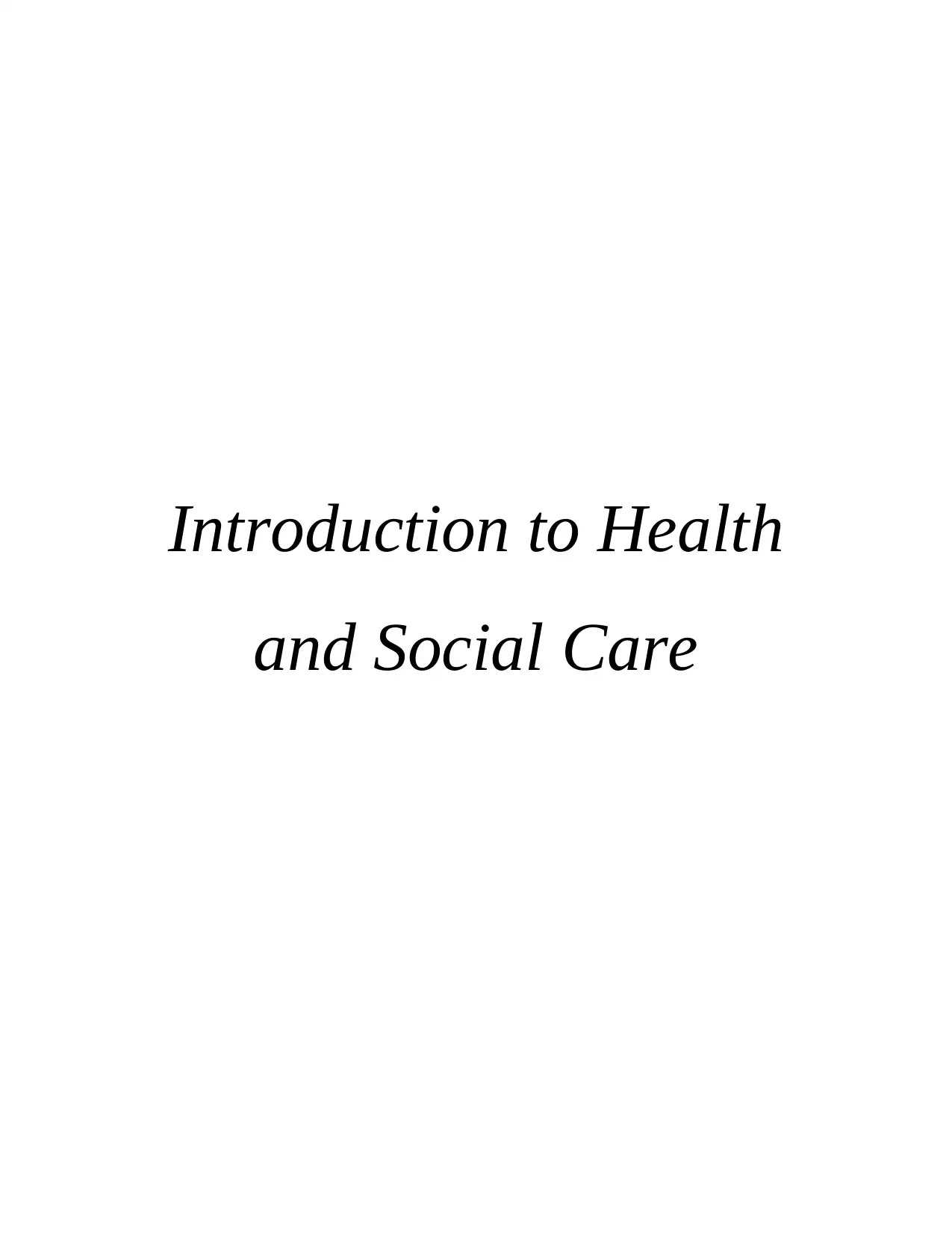
Introduction to Health
and Social Care
and Social Care
Paraphrase This Document
Need a fresh take? Get an instant paraphrase of this document with our AI Paraphraser
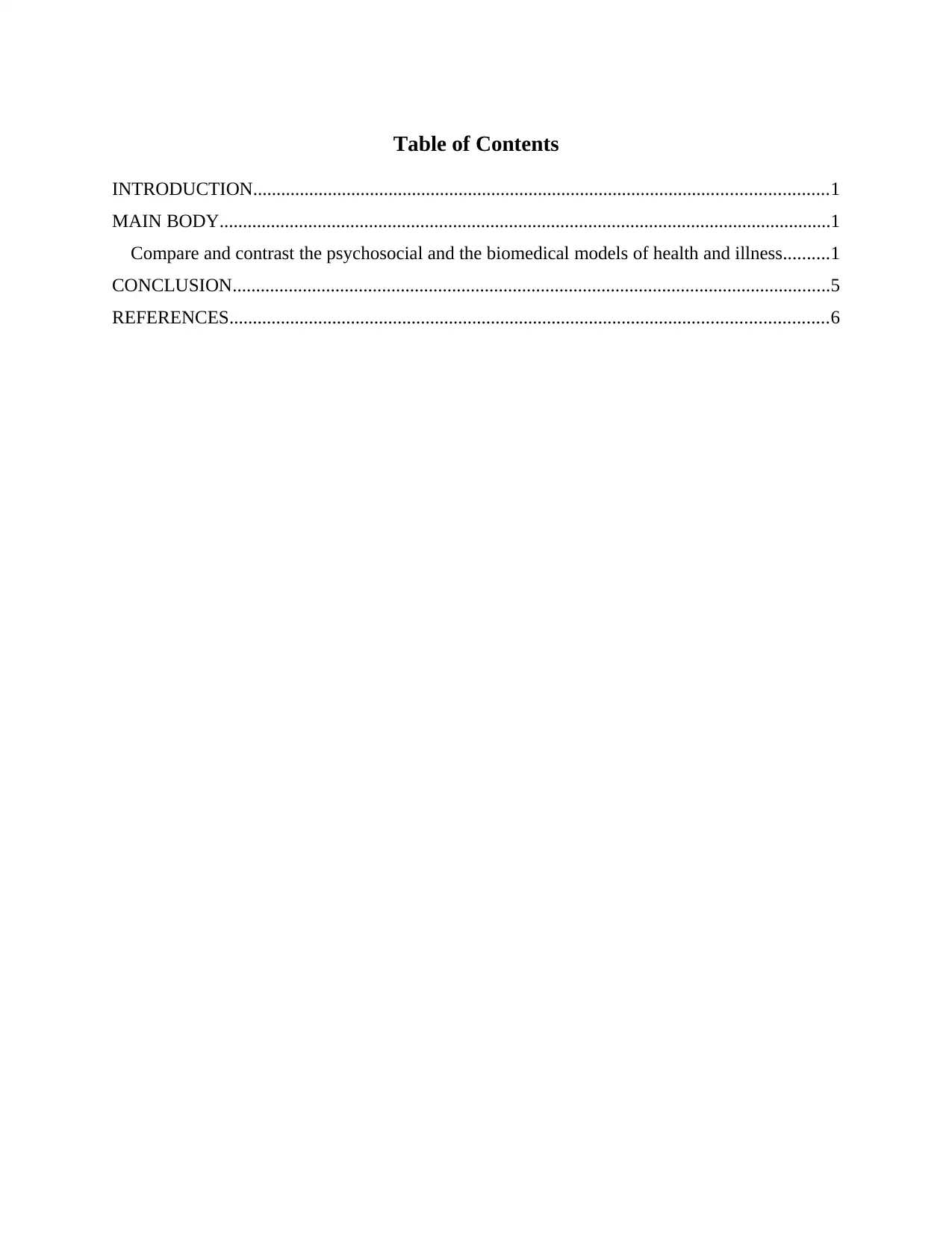
Table of Contents
INTRODUCTION...........................................................................................................................1
MAIN BODY...................................................................................................................................1
Compare and contrast the psychosocial and the biomedical models of health and illness..........1
CONCLUSION................................................................................................................................5
REFERENCES................................................................................................................................6
INTRODUCTION...........................................................................................................................1
MAIN BODY...................................................................................................................................1
Compare and contrast the psychosocial and the biomedical models of health and illness..........1
CONCLUSION................................................................................................................................5
REFERENCES................................................................................................................................6
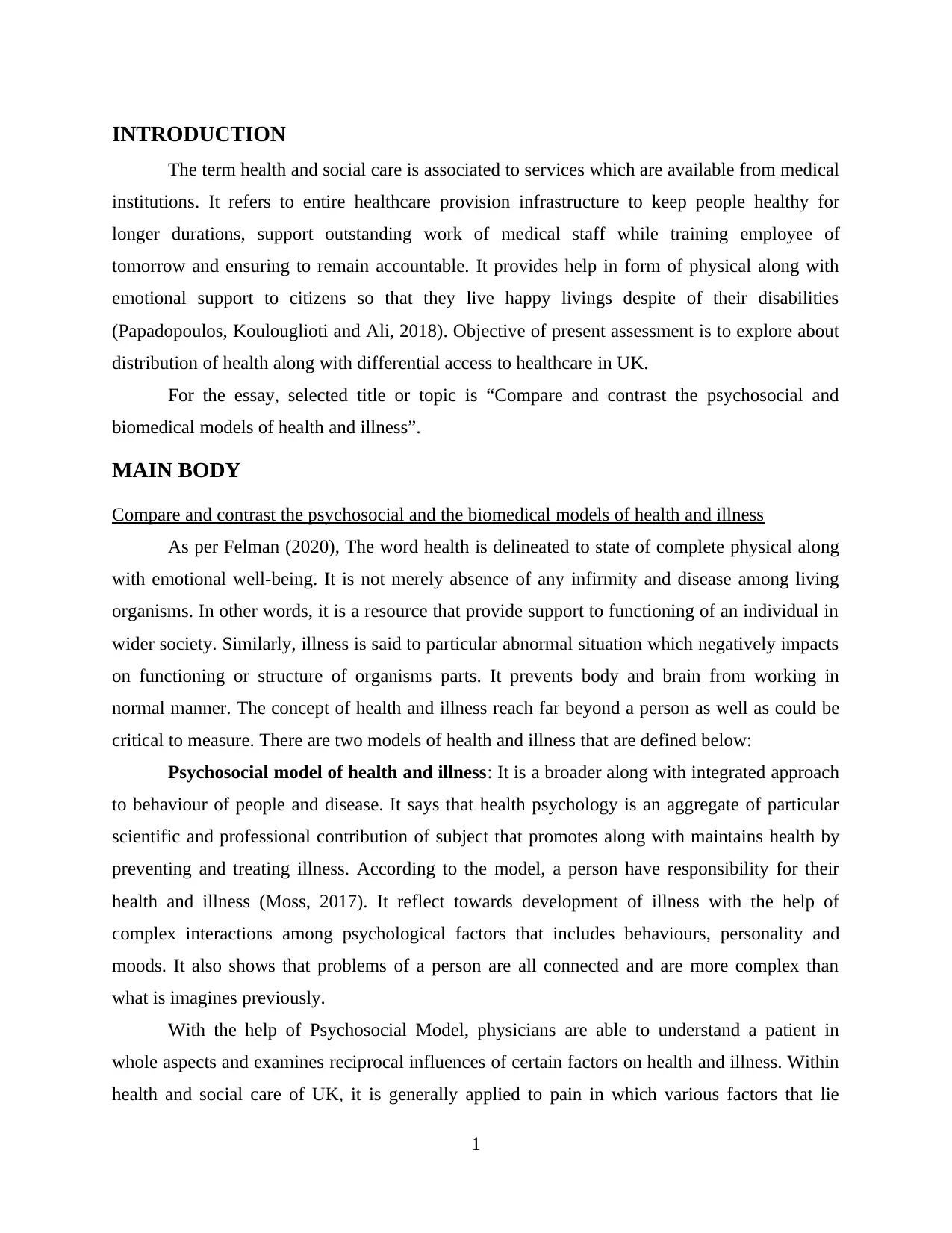
INTRODUCTION
The term health and social care is associated to services which are available from medical
institutions. It refers to entire healthcare provision infrastructure to keep people healthy for
longer durations, support outstanding work of medical staff while training employee of
tomorrow and ensuring to remain accountable. It provides help in form of physical along with
emotional support to citizens so that they live happy livings despite of their disabilities
(Papadopoulos, Koulouglioti and Ali, 2018). Objective of present assessment is to explore about
distribution of health along with differential access to healthcare in UK.
For the essay, selected title or topic is “Compare and contrast the psychosocial and
biomedical models of health and illness”.
MAIN BODY
Compare and contrast the psychosocial and the biomedical models of health and illness
As per Felman (2020), The word health is delineated to state of complete physical along
with emotional well-being. It is not merely absence of any infirmity and disease among living
organisms. In other words, it is a resource that provide support to functioning of an individual in
wider society. Similarly, illness is said to particular abnormal situation which negatively impacts
on functioning or structure of organisms parts. It prevents body and brain from working in
normal manner. The concept of health and illness reach far beyond a person as well as could be
critical to measure. There are two models of health and illness that are defined below:
Psychosocial model of health and illness: It is a broader along with integrated approach
to behaviour of people and disease. It says that health psychology is an aggregate of particular
scientific and professional contribution of subject that promotes along with maintains health by
preventing and treating illness. According to the model, a person have responsibility for their
health and illness (Moss, 2017). It reflect towards development of illness with the help of
complex interactions among psychological factors that includes behaviours, personality and
moods. It also shows that problems of a person are all connected and are more complex than
what is imagines previously.
With the help of Psychosocial Model, physicians are able to understand a patient in
whole aspects and examines reciprocal influences of certain factors on health and illness. Within
health and social care of UK, it is generally applied to pain in which various factors that lie
1
The term health and social care is associated to services which are available from medical
institutions. It refers to entire healthcare provision infrastructure to keep people healthy for
longer durations, support outstanding work of medical staff while training employee of
tomorrow and ensuring to remain accountable. It provides help in form of physical along with
emotional support to citizens so that they live happy livings despite of their disabilities
(Papadopoulos, Koulouglioti and Ali, 2018). Objective of present assessment is to explore about
distribution of health along with differential access to healthcare in UK.
For the essay, selected title or topic is “Compare and contrast the psychosocial and
biomedical models of health and illness”.
MAIN BODY
Compare and contrast the psychosocial and the biomedical models of health and illness
As per Felman (2020), The word health is delineated to state of complete physical along
with emotional well-being. It is not merely absence of any infirmity and disease among living
organisms. In other words, it is a resource that provide support to functioning of an individual in
wider society. Similarly, illness is said to particular abnormal situation which negatively impacts
on functioning or structure of organisms parts. It prevents body and brain from working in
normal manner. The concept of health and illness reach far beyond a person as well as could be
critical to measure. There are two models of health and illness that are defined below:
Psychosocial model of health and illness: It is a broader along with integrated approach
to behaviour of people and disease. It says that health psychology is an aggregate of particular
scientific and professional contribution of subject that promotes along with maintains health by
preventing and treating illness. According to the model, a person have responsibility for their
health and illness (Moss, 2017). It reflect towards development of illness with the help of
complex interactions among psychological factors that includes behaviours, personality and
moods. It also shows that problems of a person are all connected and are more complex than
what is imagines previously.
With the help of Psychosocial Model, physicians are able to understand a patient in
whole aspects and examines reciprocal influences of certain factors on health and illness. Within
health and social care of UK, it is generally applied to pain in which various factors that lie
1
⊘ This is a preview!⊘
Do you want full access?
Subscribe today to unlock all pages.

Trusted by 1+ million students worldwide
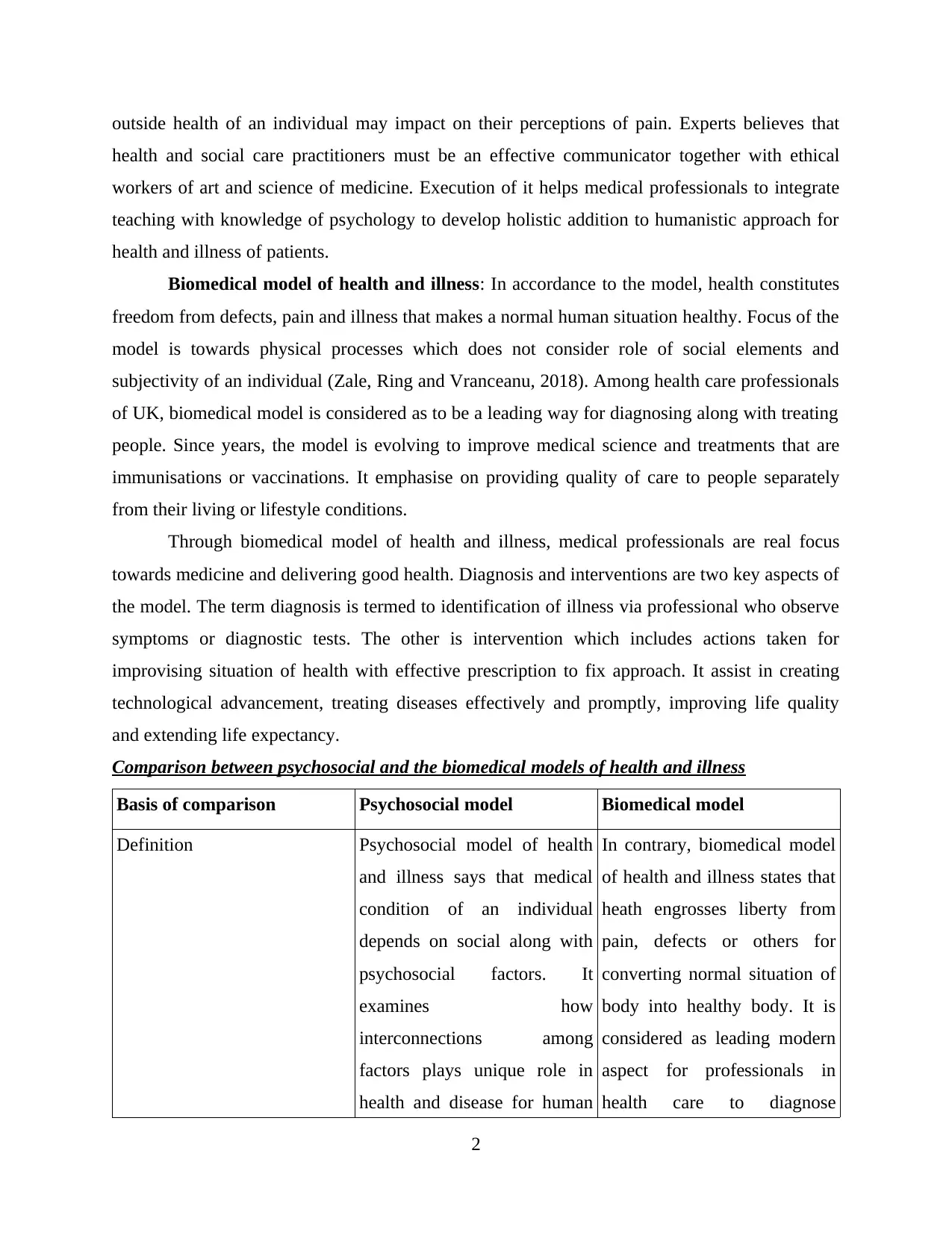
outside health of an individual may impact on their perceptions of pain. Experts believes that
health and social care practitioners must be an effective communicator together with ethical
workers of art and science of medicine. Execution of it helps medical professionals to integrate
teaching with knowledge of psychology to develop holistic addition to humanistic approach for
health and illness of patients.
Biomedical model of health and illness: In accordance to the model, health constitutes
freedom from defects, pain and illness that makes a normal human situation healthy. Focus of the
model is towards physical processes which does not consider role of social elements and
subjectivity of an individual (Zale, Ring and Vranceanu, 2018). Among health care professionals
of UK, biomedical model is considered as to be a leading way for diagnosing along with treating
people. Since years, the model is evolving to improve medical science and treatments that are
immunisations or vaccinations. It emphasise on providing quality of care to people separately
from their living or lifestyle conditions.
Through biomedical model of health and illness, medical professionals are real focus
towards medicine and delivering good health. Diagnosis and interventions are two key aspects of
the model. The term diagnosis is termed to identification of illness via professional who observe
symptoms or diagnostic tests. The other is intervention which includes actions taken for
improvising situation of health with effective prescription to fix approach. It assist in creating
technological advancement, treating diseases effectively and promptly, improving life quality
and extending life expectancy.
Comparison between psychosocial and the biomedical models of health and illness
Basis of comparison Psychosocial model Biomedical model
Definition Psychosocial model of health
and illness says that medical
condition of an individual
depends on social along with
psychosocial factors. It
examines how
interconnections among
factors plays unique role in
health and disease for human
In contrary, biomedical model
of health and illness states that
heath engrosses liberty from
pain, defects or others for
converting normal situation of
body into healthy body. It is
considered as leading modern
aspect for professionals in
health care to diagnose
2
health and social care practitioners must be an effective communicator together with ethical
workers of art and science of medicine. Execution of it helps medical professionals to integrate
teaching with knowledge of psychology to develop holistic addition to humanistic approach for
health and illness of patients.
Biomedical model of health and illness: In accordance to the model, health constitutes
freedom from defects, pain and illness that makes a normal human situation healthy. Focus of the
model is towards physical processes which does not consider role of social elements and
subjectivity of an individual (Zale, Ring and Vranceanu, 2018). Among health care professionals
of UK, biomedical model is considered as to be a leading way for diagnosing along with treating
people. Since years, the model is evolving to improve medical science and treatments that are
immunisations or vaccinations. It emphasise on providing quality of care to people separately
from their living or lifestyle conditions.
Through biomedical model of health and illness, medical professionals are real focus
towards medicine and delivering good health. Diagnosis and interventions are two key aspects of
the model. The term diagnosis is termed to identification of illness via professional who observe
symptoms or diagnostic tests. The other is intervention which includes actions taken for
improvising situation of health with effective prescription to fix approach. It assist in creating
technological advancement, treating diseases effectively and promptly, improving life quality
and extending life expectancy.
Comparison between psychosocial and the biomedical models of health and illness
Basis of comparison Psychosocial model Biomedical model
Definition Psychosocial model of health
and illness says that medical
condition of an individual
depends on social along with
psychosocial factors. It
examines how
interconnections among
factors plays unique role in
health and disease for human
In contrary, biomedical model
of health and illness states that
heath engrosses liberty from
pain, defects or others for
converting normal situation of
body into healthy body. It is
considered as leading modern
aspect for professionals in
health care to diagnose
2
Paraphrase This Document
Need a fresh take? Get an instant paraphrase of this document with our AI Paraphraser
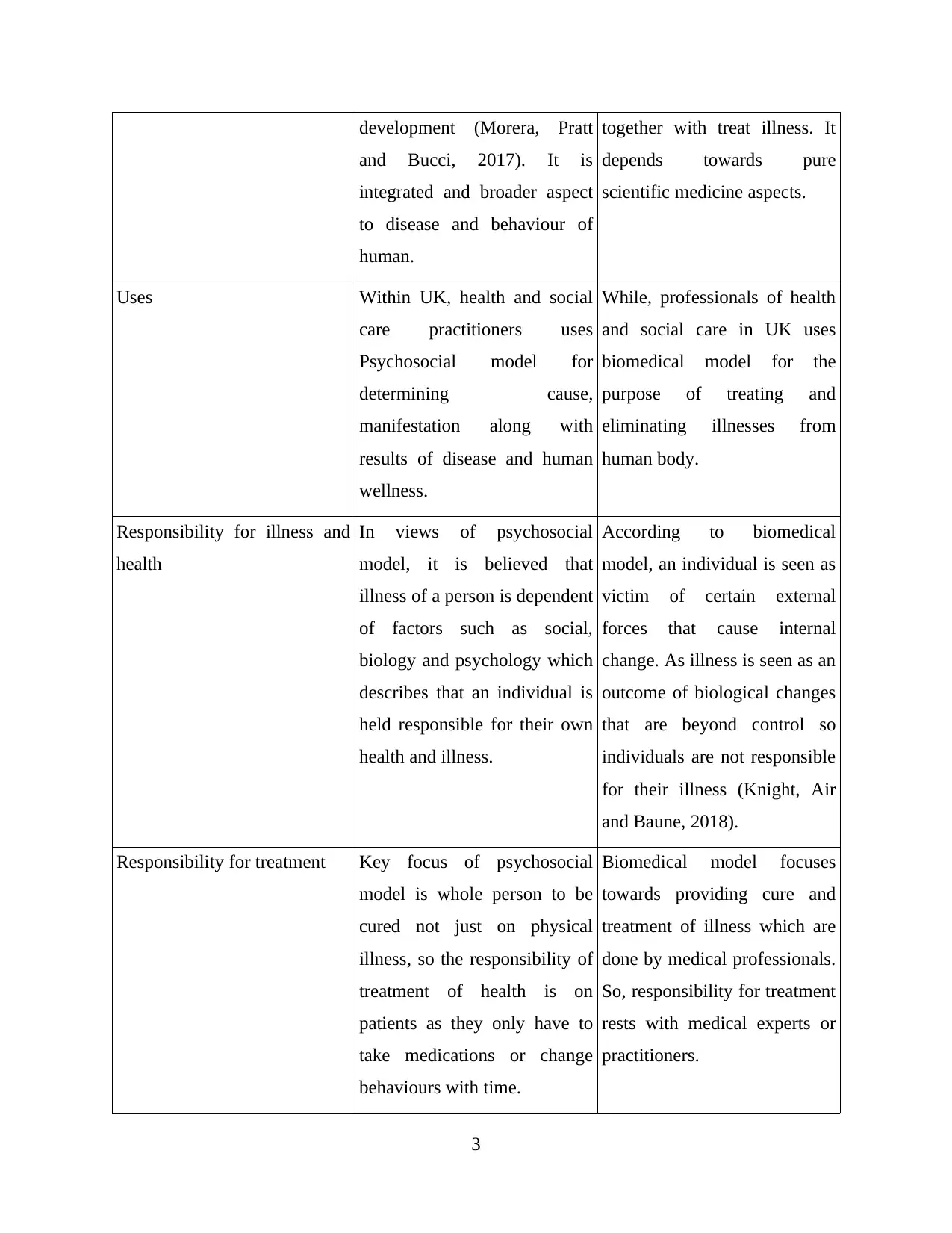
development (Morera, Pratt
and Bucci, 2017). It is
integrated and broader aspect
to disease and behaviour of
human.
together with treat illness. It
depends towards pure
scientific medicine aspects.
Uses Within UK, health and social
care practitioners uses
Psychosocial model for
determining cause,
manifestation along with
results of disease and human
wellness.
While, professionals of health
and social care in UK uses
biomedical model for the
purpose of treating and
eliminating illnesses from
human body.
Responsibility for illness and
health
In views of psychosocial
model, it is believed that
illness of a person is dependent
of factors such as social,
biology and psychology which
describes that an individual is
held responsible for their own
health and illness.
According to biomedical
model, an individual is seen as
victim of certain external
forces that cause internal
change. As illness is seen as an
outcome of biological changes
that are beyond control so
individuals are not responsible
for their illness (Knight, Air
and Baune, 2018).
Responsibility for treatment Key focus of psychosocial
model is whole person to be
cured not just on physical
illness, so the responsibility of
treatment of health is on
patients as they only have to
take medications or change
behaviours with time.
Biomedical model focuses
towards providing cure and
treatment of illness which are
done by medical professionals.
So, responsibility for treatment
rests with medical experts or
practitioners.
3
and Bucci, 2017). It is
integrated and broader aspect
to disease and behaviour of
human.
together with treat illness. It
depends towards pure
scientific medicine aspects.
Uses Within UK, health and social
care practitioners uses
Psychosocial model for
determining cause,
manifestation along with
results of disease and human
wellness.
While, professionals of health
and social care in UK uses
biomedical model for the
purpose of treating and
eliminating illnesses from
human body.
Responsibility for illness and
health
In views of psychosocial
model, it is believed that
illness of a person is dependent
of factors such as social,
biology and psychology which
describes that an individual is
held responsible for their own
health and illness.
According to biomedical
model, an individual is seen as
victim of certain external
forces that cause internal
change. As illness is seen as an
outcome of biological changes
that are beyond control so
individuals are not responsible
for their illness (Knight, Air
and Baune, 2018).
Responsibility for treatment Key focus of psychosocial
model is whole person to be
cured not just on physical
illness, so the responsibility of
treatment of health is on
patients as they only have to
take medications or change
behaviours with time.
Biomedical model focuses
towards providing cure and
treatment of illness which are
done by medical professionals.
So, responsibility for treatment
rests with medical experts or
practitioners.
3
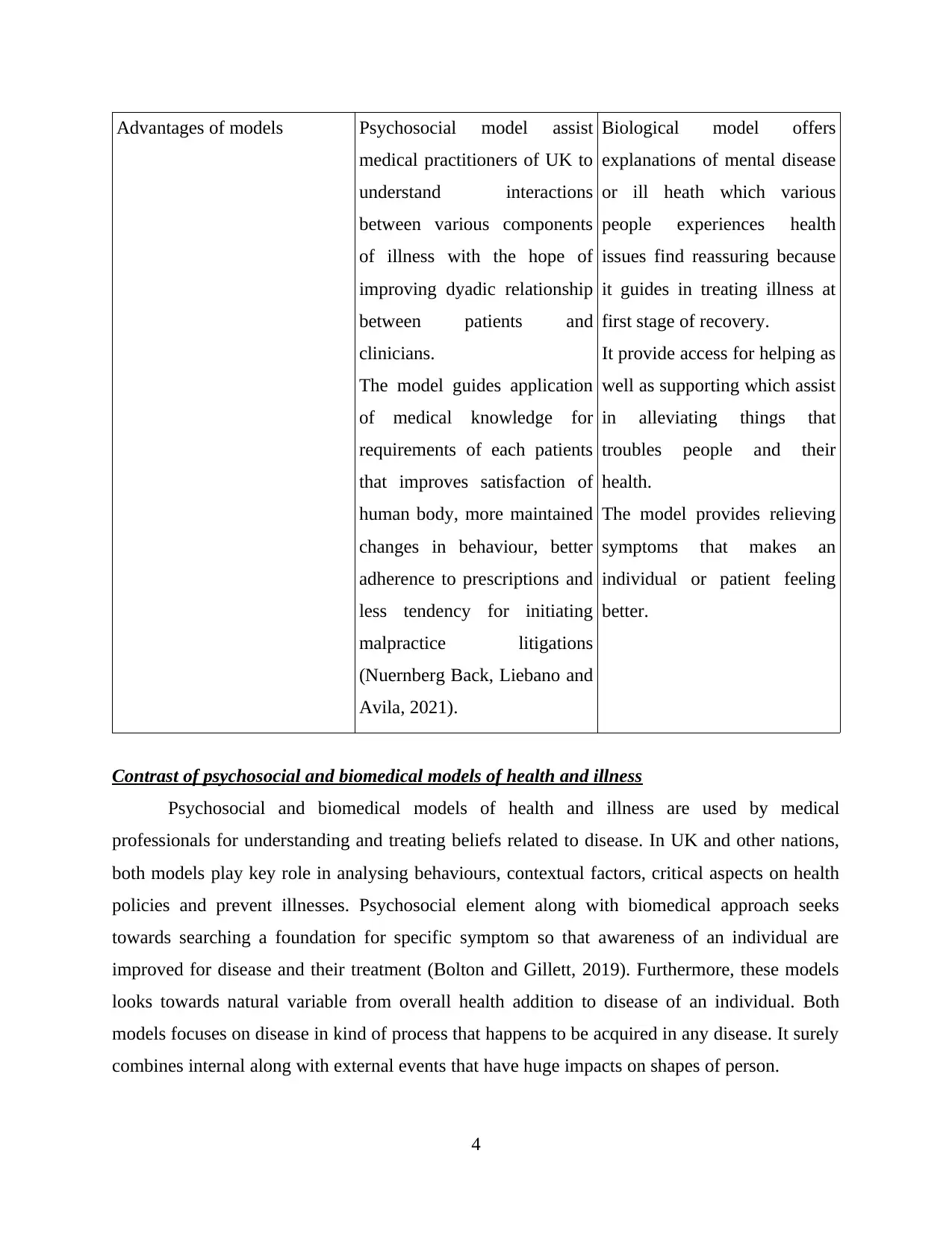
Advantages of models Psychosocial model assist
medical practitioners of UK to
understand interactions
between various components
of illness with the hope of
improving dyadic relationship
between patients and
clinicians.
The model guides application
of medical knowledge for
requirements of each patients
that improves satisfaction of
human body, more maintained
changes in behaviour, better
adherence to prescriptions and
less tendency for initiating
malpractice litigations
(Nuernberg Back, Liebano and
Avila, 2021).
Biological model offers
explanations of mental disease
or ill heath which various
people experiences health
issues find reassuring because
it guides in treating illness at
first stage of recovery.
It provide access for helping as
well as supporting which assist
in alleviating things that
troubles people and their
health.
The model provides relieving
symptoms that makes an
individual or patient feeling
better.
Contrast of psychosocial and biomedical models of health and illness
Psychosocial and biomedical models of health and illness are used by medical
professionals for understanding and treating beliefs related to disease. In UK and other nations,
both models play key role in analysing behaviours, contextual factors, critical aspects on health
policies and prevent illnesses. Psychosocial element along with biomedical approach seeks
towards searching a foundation for specific symptom so that awareness of an individual are
improved for disease and their treatment (Bolton and Gillett, 2019). Furthermore, these models
looks towards natural variable from overall health addition to disease of an individual. Both
models focuses on disease in kind of process that happens to be acquired in any disease. It surely
combines internal along with external events that have huge impacts on shapes of person.
4
medical practitioners of UK to
understand interactions
between various components
of illness with the hope of
improving dyadic relationship
between patients and
clinicians.
The model guides application
of medical knowledge for
requirements of each patients
that improves satisfaction of
human body, more maintained
changes in behaviour, better
adherence to prescriptions and
less tendency for initiating
malpractice litigations
(Nuernberg Back, Liebano and
Avila, 2021).
Biological model offers
explanations of mental disease
or ill heath which various
people experiences health
issues find reassuring because
it guides in treating illness at
first stage of recovery.
It provide access for helping as
well as supporting which assist
in alleviating things that
troubles people and their
health.
The model provides relieving
symptoms that makes an
individual or patient feeling
better.
Contrast of psychosocial and biomedical models of health and illness
Psychosocial and biomedical models of health and illness are used by medical
professionals for understanding and treating beliefs related to disease. In UK and other nations,
both models play key role in analysing behaviours, contextual factors, critical aspects on health
policies and prevent illnesses. Psychosocial element along with biomedical approach seeks
towards searching a foundation for specific symptom so that awareness of an individual are
improved for disease and their treatment (Bolton and Gillett, 2019). Furthermore, these models
looks towards natural variable from overall health addition to disease of an individual. Both
models focuses on disease in kind of process that happens to be acquired in any disease. It surely
combines internal along with external events that have huge impacts on shapes of person.
4
⊘ This is a preview!⊘
Do you want full access?
Subscribe today to unlock all pages.

Trusted by 1+ million students worldwide
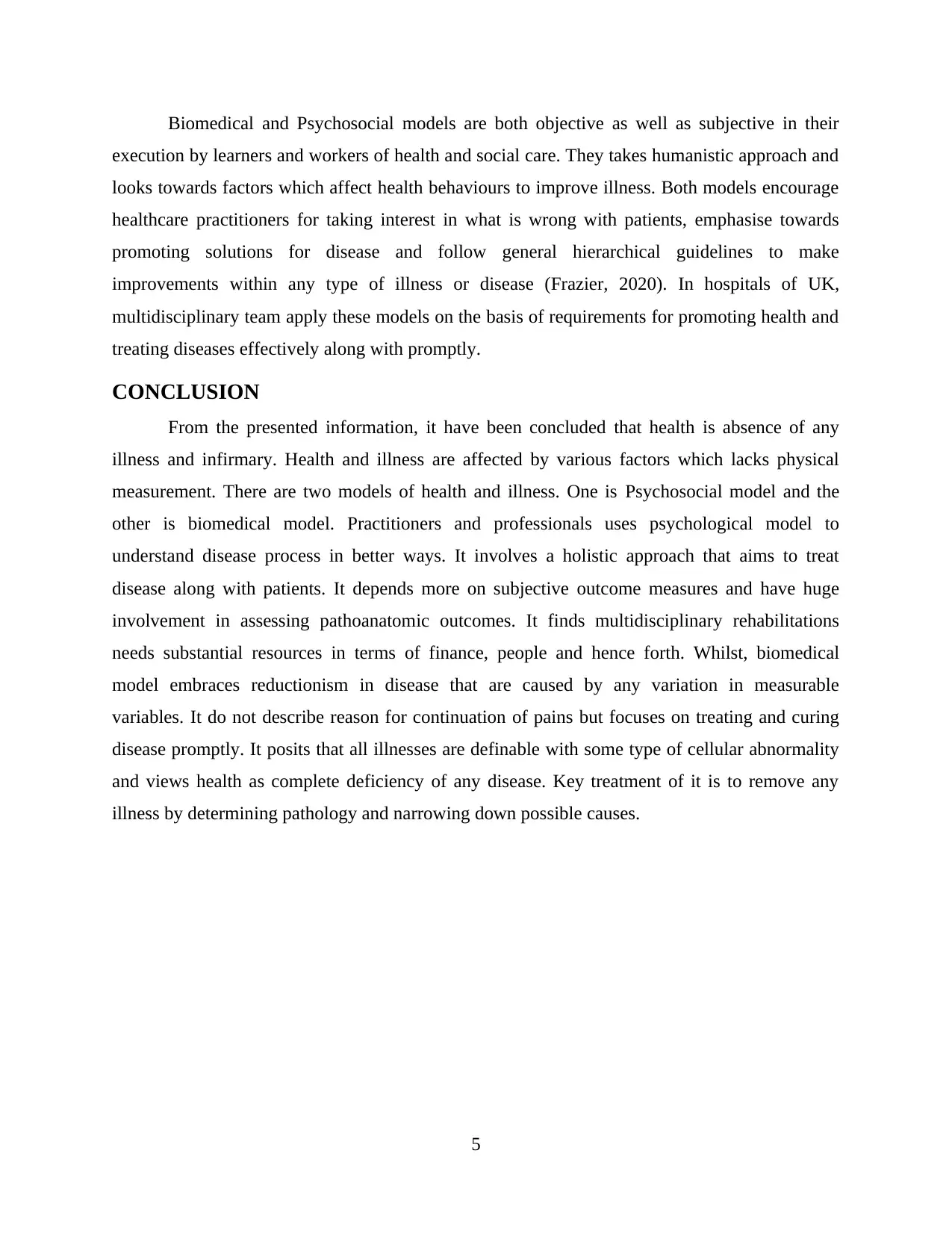
Biomedical and Psychosocial models are both objective as well as subjective in their
execution by learners and workers of health and social care. They takes humanistic approach and
looks towards factors which affect health behaviours to improve illness. Both models encourage
healthcare practitioners for taking interest in what is wrong with patients, emphasise towards
promoting solutions for disease and follow general hierarchical guidelines to make
improvements within any type of illness or disease (Frazier, 2020). In hospitals of UK,
multidisciplinary team apply these models on the basis of requirements for promoting health and
treating diseases effectively along with promptly.
CONCLUSION
From the presented information, it have been concluded that health is absence of any
illness and infirmary. Health and illness are affected by various factors which lacks physical
measurement. There are two models of health and illness. One is Psychosocial model and the
other is biomedical model. Practitioners and professionals uses psychological model to
understand disease process in better ways. It involves a holistic approach that aims to treat
disease along with patients. It depends more on subjective outcome measures and have huge
involvement in assessing pathoanatomic outcomes. It finds multidisciplinary rehabilitations
needs substantial resources in terms of finance, people and hence forth. Whilst, biomedical
model embraces reductionism in disease that are caused by any variation in measurable
variables. It do not describe reason for continuation of pains but focuses on treating and curing
disease promptly. It posits that all illnesses are definable with some type of cellular abnormality
and views health as complete deficiency of any disease. Key treatment of it is to remove any
illness by determining pathology and narrowing down possible causes.
5
execution by learners and workers of health and social care. They takes humanistic approach and
looks towards factors which affect health behaviours to improve illness. Both models encourage
healthcare practitioners for taking interest in what is wrong with patients, emphasise towards
promoting solutions for disease and follow general hierarchical guidelines to make
improvements within any type of illness or disease (Frazier, 2020). In hospitals of UK,
multidisciplinary team apply these models on the basis of requirements for promoting health and
treating diseases effectively along with promptly.
CONCLUSION
From the presented information, it have been concluded that health is absence of any
illness and infirmary. Health and illness are affected by various factors which lacks physical
measurement. There are two models of health and illness. One is Psychosocial model and the
other is biomedical model. Practitioners and professionals uses psychological model to
understand disease process in better ways. It involves a holistic approach that aims to treat
disease along with patients. It depends more on subjective outcome measures and have huge
involvement in assessing pathoanatomic outcomes. It finds multidisciplinary rehabilitations
needs substantial resources in terms of finance, people and hence forth. Whilst, biomedical
model embraces reductionism in disease that are caused by any variation in measurable
variables. It do not describe reason for continuation of pains but focuses on treating and curing
disease promptly. It posits that all illnesses are definable with some type of cellular abnormality
and views health as complete deficiency of any disease. Key treatment of it is to remove any
illness by determining pathology and narrowing down possible causes.
5
Paraphrase This Document
Need a fresh take? Get an instant paraphrase of this document with our AI Paraphraser
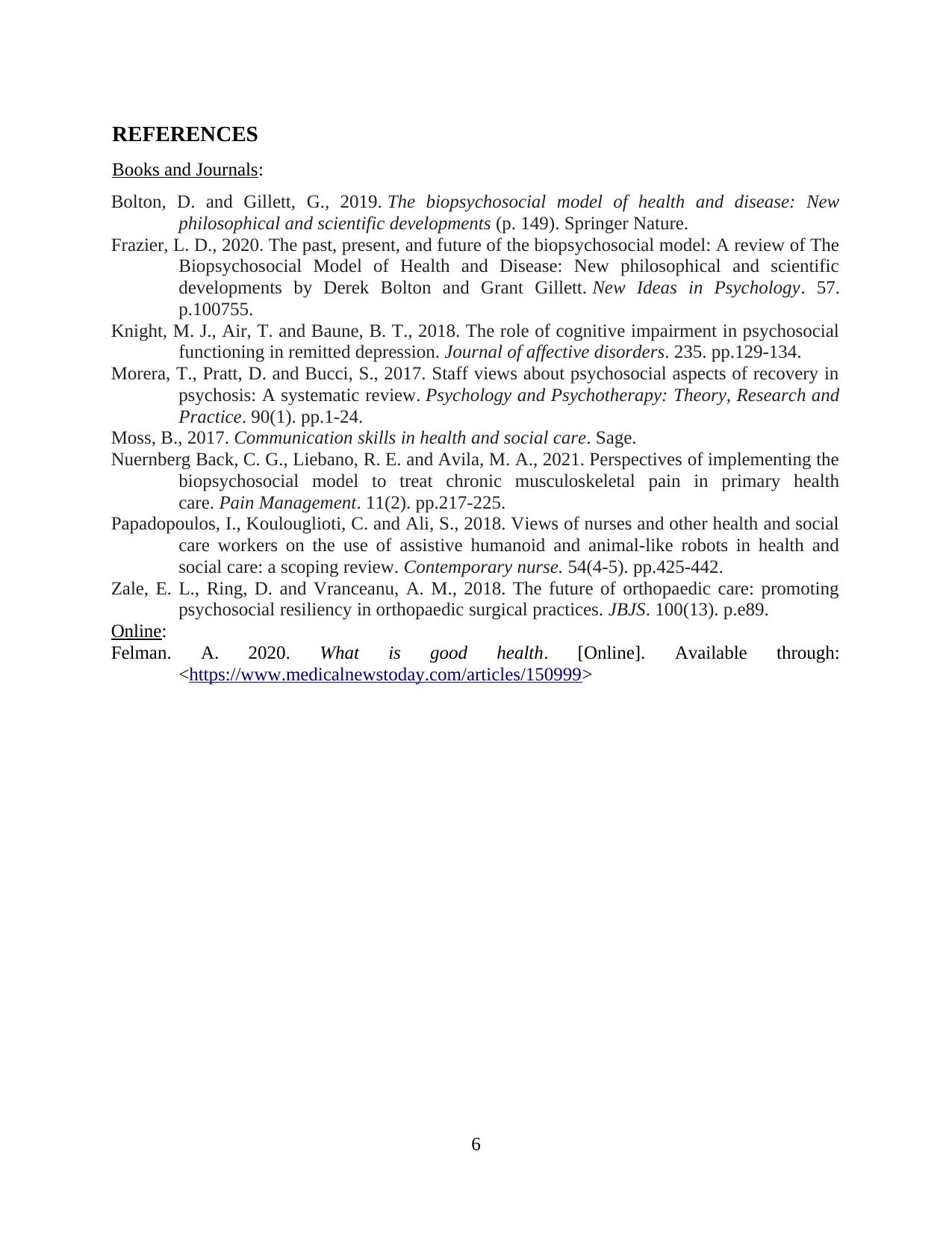
REFERENCES
Books and Journals:
Bolton, D. and Gillett, G., 2019. The biopsychosocial model of health and disease: New
philosophical and scientific developments (p. 149). Springer Nature.
Frazier, L. D., 2020. The past, present, and future of the biopsychosocial model: A review of The
Biopsychosocial Model of Health and Disease: New philosophical and scientific
developments by Derek Bolton and Grant Gillett. New Ideas in Psychology. 57.
p.100755.
Knight, M. J., Air, T. and Baune, B. T., 2018. The role of cognitive impairment in psychosocial
functioning in remitted depression. Journal of affective disorders. 235. pp.129-134.
Morera, T., Pratt, D. and Bucci, S., 2017. Staff views about psychosocial aspects of recovery in
psychosis: A systematic review. Psychology and Psychotherapy: Theory, Research and
Practice. 90(1). pp.1-24.
Moss, B., 2017. Communication skills in health and social care. Sage.
Nuernberg Back, C. G., Liebano, R. E. and Avila, M. A., 2021. Perspectives of implementing the
biopsychosocial model to treat chronic musculoskeletal pain in primary health
care. Pain Management. 11(2). pp.217-225.
Papadopoulos, I., Koulouglioti, C. and Ali, S., 2018. Views of nurses and other health and social
care workers on the use of assistive humanoid and animal-like robots in health and
social care: a scoping review. Contemporary nurse. 54(4-5). pp.425-442.
Zale, E. L., Ring, D. and Vranceanu, A. M., 2018. The future of orthopaedic care: promoting
psychosocial resiliency in orthopaedic surgical practices. JBJS. 100(13). p.e89.
Online:
Felman. A. 2020. What is good health. [Online]. Available through:
<https://www.medicalnewstoday.com/articles/150999>
6
Books and Journals:
Bolton, D. and Gillett, G., 2019. The biopsychosocial model of health and disease: New
philosophical and scientific developments (p. 149). Springer Nature.
Frazier, L. D., 2020. The past, present, and future of the biopsychosocial model: A review of The
Biopsychosocial Model of Health and Disease: New philosophical and scientific
developments by Derek Bolton and Grant Gillett. New Ideas in Psychology. 57.
p.100755.
Knight, M. J., Air, T. and Baune, B. T., 2018. The role of cognitive impairment in psychosocial
functioning in remitted depression. Journal of affective disorders. 235. pp.129-134.
Morera, T., Pratt, D. and Bucci, S., 2017. Staff views about psychosocial aspects of recovery in
psychosis: A systematic review. Psychology and Psychotherapy: Theory, Research and
Practice. 90(1). pp.1-24.
Moss, B., 2017. Communication skills in health and social care. Sage.
Nuernberg Back, C. G., Liebano, R. E. and Avila, M. A., 2021. Perspectives of implementing the
biopsychosocial model to treat chronic musculoskeletal pain in primary health
care. Pain Management. 11(2). pp.217-225.
Papadopoulos, I., Koulouglioti, C. and Ali, S., 2018. Views of nurses and other health and social
care workers on the use of assistive humanoid and animal-like robots in health and
social care: a scoping review. Contemporary nurse. 54(4-5). pp.425-442.
Zale, E. L., Ring, D. and Vranceanu, A. M., 2018. The future of orthopaedic care: promoting
psychosocial resiliency in orthopaedic surgical practices. JBJS. 100(13). p.e89.
Online:
Felman. A. 2020. What is good health. [Online]. Available through:
<https://www.medicalnewstoday.com/articles/150999>
6
1 out of 8
Related Documents
Your All-in-One AI-Powered Toolkit for Academic Success.
+13062052269
info@desklib.com
Available 24*7 on WhatsApp / Email
![[object Object]](/_next/static/media/star-bottom.7253800d.svg)
Unlock your academic potential
Copyright © 2020–2026 A2Z Services. All Rights Reserved. Developed and managed by ZUCOL.





